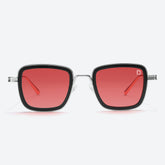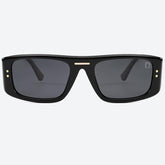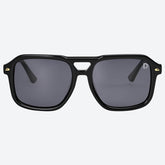How To Choose The Right Sunglasses For Old People?
Sunglasses are not only a fashion accessory but also a necessity for seniors who want to protect their eyes and vision from the harmful effects of the sun. However, not all sunglasses are created equal, and some may even do more harm than good. In this article, we will explain how to choose the right sunglasses for seniors.
Why Older People Are Starting To Wear Sunglasses On The Street?

Sunglasses are not just for the beach or the pool. Older people are starting to wear sunglasses on the street too, for various reasons. Some of the benefits of wearing sunglasses for seniors are:
Reducing the risk of cataracts and macular degeneration. These are two common eye diseases that affect many seniors, and they are both linked to exposure to ultraviolet (UV) rays from the sun. Wearing sunglasses that block 100% of UVA and UVB rays can help slow down the development of cataracts and macular degeneration, and delay or prevent the need for surgery.
Fighting glare and preventing falls. Glare from sunlight and headlights can cause headaches and impair vision, especially for seniors who have glaucoma or other eye conditions that make them more sensitive to light. This can create driving hazards and increase the risk of falls and injuries. Wearing sunglasses with anti-reflective lens coatings and an amber tint can reduce glare and improve contrast and clarity.
Taking care of your skin and being aware of sun protection. The skin around the eyes is delicate and prone to sun damage, which can cause wrinkles, sagging, and skin cancer. Sunglasses can also remind seniors to apply sunscreen and wear hats and clothing that offer sun protection.
Demonstrating youthfulness and vitality. Sunglasses can also be a way of expressing your personality and style and showing that you are still young at heart. There are many types and colors of sunglasses to choose from, and you can find the ones that suit your face shape and complement your outfit. Sunglasses can also make you look more confident and attractive, and boost your mood and self-esteem.
When Older People Start Wearing Sunglasses?
It is recommended that seniors wear sunglasses whenever they are outdoors, especially during the peak hours of sun exposure and in places where the sun is more intense, such as near water, snow, or sand. Even on cloudy or overcast days, UV rays can still penetrate the clouds and reach the eyes, so sunglasses are still necessary.
The Ultimate Guide: Sunglasses For Old People Selection Steps

By following these simple steps, seniors can find the sunglasses that suit their needs and preferences, and enjoy the benefits of wearing sunglasses.
Check the UV protection
This is the most important step, as UV protection is the main reason for wearing sunglasses.
Choose the polarization
This is an optional step, as polarization is not essential for eye protection, but it can enhance the vision and comfort of seniors who are bothered by glare.
Choose the color and tint
This is a personal step, as color and tint depend on the preference and needs of the senior, as well as the environment and activity they are engaged in. Try different colors and tints, and see which ones make you see better and feel more comfortable.
Choose the coatings
This is an optional step, as coatings are not essential for eye protection, but they can add extra features and benefits to the lenses. Look for sunglasses that have anti-reflective, scratch-resistant, or mirror coatings, depending on your needs and preferences, and make sure they do not affect the quality and clarity of the vision.
Choose the frames
This is the final step, as frames are the most visible and noticeable part of the sunglasses, and they can affect the fit, comfort, and style of the sunglasses. Look for frames that are:
Good quality. Choose frames that are made of durable and lightweight materials, such as metal, plastic, or wood, and that have sturdy hinges and screws. Avoid frames that are cheap, flimsy, or broken, as they can cause irritation, injury, or infection to the eyes or skin.
Lifestyle habits. Choose frames that match your lifestyle habits and activities, and that are appropriate for the occasion and the weather. For example, if you are active and sporty, choose frames that are wraparound, rubberized, or have nose pads or ear grips, to prevent them from slipping or falling off. If you are fashionable, choose frames that are colorful, stylish, or have unique shapes or patterns, to express your personality and mood.
Face shape. Choose frames that suit your face shape and complement your facial features. The general rule is to choose frames that contrast with your face shape, to create balance and harmony. For example, if you have a round face, choose frames that are angular, square, or rectangular, to make your face look longer and thinner. If you have a square face, choose frames that are round, oval, or cat-eye, to soften your angles and add some curves. If you have an oval face, choose frames that are proportional, balanced, or slightly wider than your face, to maintain your natural symmetry. If you have a heart-shaped face, choose frames that are bottom-heavy, rimless, or aviator, to draw attention away from your forehead and balance your chin.
Notes On Sunglasses Fitting For Elderly People

After choosing old people sunglasses, it is also important to make sure that they fit well and comfortably on the face. Here are some tips on how to check the sunglasses fitting for elderly people:
Crossing the street or to the shade, to remove the sunglasses promptly, because from a bright place to a darker place, or the concentration of people and vehicles, the eyes have an adaptation process that can easily lead to seeing, this time should be removed promptly sunglasses, it is safer.
Wear sunglasses time should not be too long, every one or two hours recommended to take off the glasses to take a break, and gently massage around the eyes, it is easy to have headaches, irritability, blurred vision, and other symptoms, and even lead to vision loss.
Elderly crystal aging swelling, can not wear sunglasses for a long time, otherwise, it will cause the iris root buildup, resulting in atrial aqueous flow obstruction, and increased intraocular pressure.
Elderly people with glaucoma, retinitis, color blindness, and night blindness are not suitable for wearing sunglasses.
How To Fit Sunglasses For The Elderly?

Elderly people should have a comprehensive eye examination and optometry to determine their visual acuity and lens prescription before fitting the lenses.3 After the lenses have been fitted, they should try on the lenses for a while to see if they are comfortable, clear, and free of glare.3 Elderly people should wear the lenses for different occasions, and different lenses are suitable for different distances and uses.3 For example, presbyopia is suitable for reading books and newspapers in the near distance and is not suitable for watching TV in the far distance; progressive lenses are suitable for watching objects in the far distance, but require turning of the head to see different objects, but require turning of the head to see different objects in the near distance. different objects, but require turning the head rather than the eyeballs to adjust vision.
The Best Product Dollger Can Offer You
If you are looking for the best sunglasses for seniors, you may want to check out the products from Dollger, a leading brand of sunglasses that offers high-quality, stylish, and affordable options for all ages and preferences. Dollger Polarized Sunglasses for Men and Women. These are classic and versatile sunglasses that feature polarized lenses, UV400 protection, metal frames, and adjustable nose pads. They are ideal for seniors who want sunglasses that are simple, elegant, and effective.
Conclusion
Sunglasses are not only a fashion accessory but also a necessity for seniors who want to protect their eyes and vision from the harmful effects of the sun. Therefore, seniors should choose the right sunglasses for them, based on the UV protection, polarization, color and tint, coatings, and frames of the sunglasses. They should also make sure that the sunglasses fit well and comfortably and do not impair their vision. By following these tips and steps, seniors can find the sunglasses that suit their needs and preferences, and enjoy the benefits of wearing sunglasses.





